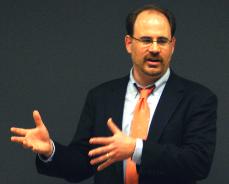By Alan Bean

Steven Teles
In The Rise of the Conservative Legal Movement, Steven Teles describes how the conservative movement was able to undermine and largely replace what he calls the Liberal Legal Network (LLN for short). By the late 1960s, liberal ideas inspired by New Deal politics and the civil rights movement were deeply entrenched within the American legal establishment. To change this picture, Teles says, conservative counter insurgents had to realize that they were dealing with a hegemonic regime.
A regime is most likely to endure when it can make its ideas seem natural, appropriate, and commonsensical, consigning its opponents to the extremes . . . A regime that has achieved hegemony makes its principles seem like ‘good professional practice,’ ‘standard operating procedure,’ ‘the public interest,’ or ‘conventional wisdom.’ Those who fail to affirm these principles are stigmatized, and their arguments are dismissed.
In order to overcome this kind of hegemonic reality, Teles suggests, “intellectual entrepreneurs” must “‘denaturalize’ the existing regime, by exposing the hidden normative assumptions embedded in seemingly neutral professional, scientific, or procedural standards and practices, forcing those assumptions to be justified and alternatives to them entertained.”
This analysis got me thinking. Friends of Justice, the faith-based non-profit I direct, is encouraging American churches to embrace a biblical “common peace” perspective on immigration and criminal justice issues. This agenda makes perfect sense to most Latino and African American Christians, but is often greeted with a mixture of bewilderment, suspicion and hostility in Anglo religious circles. I’m not talking about conservative evangelical congregations or the religious right; the churches I’m describing are a blend of standard issue evangelicalism and big steeple Protestantism. People in these churches value niceness above all other virtues, but they sometimes have a hard time relating to the concept of a Common Peace Community.
We are dealing with a hegemonic regime rooted in deeply embedded assumptions that, in Anglo churches at least, have attained the status of the ‘good professional practice,’ ‘standard operating procedure,’ ‘community interest,’ or ‘conventional wisdom’ Steve Teles talks about. Why does a politically irrelevant religion seem natural, appropriate, and commonsensical to so many white Christians?
To understand the conventional wisdom at work in white churches we must confront the assumptions at the root of the problem. Here is my first stab at culling out the assumptions. Some of these, especially five and six, might sound a bit unfair since church people rarely put these assumptions into words. My point is that we generally act on these assumptions, whether or not we give them utterance.
Six assumptions that keep white churches from applying biblical norms to immigration and criminal justice
- The immigration and criminal justice systems should be left to lawyers and politicians. It doesn’t really matter what Christians think about these issues because we lack the expertise and standing to form a credible opinions or impact public policy decisions.
- Churches should avoid partisan politics. Institutional tranquility demands that the political implications of our religion must never be discussed in religious settings.
- Religion is a source of security in a troubled world. Crime and illegal immigration threaten my personal security, so I am reassured by political tough talk.
- Religion is about saving souls, promoting a sense of personal well-being, nurturing personal relationships, and sustaining a spiritual family. Public policy issues conflict with these priorities.
- It’s great that racial minorities are taking an interest in politics so long as they understand that American politics is designed to maximize the prosperity and personal happiness of white people.
- It’s fine for racial minorities to attend churches and think religious thoughts so long as they understand that American Christianity is a white person’s religion that must be restricted to matters that white people care about.
Again, my point is not that we say these things out loud, or even that we consciously approve of them. I theorize that these ideas must operate as unexamined, a priori assumptions because most of us behave as if they were true.
